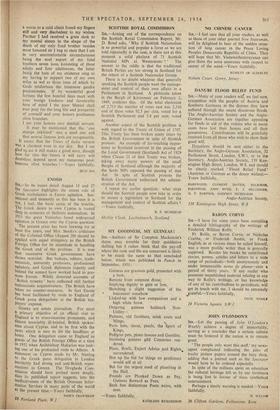ENOSIS
SIR,—In its issues dated August 13 and 27 the Spectator highlights the recent role of Greek ecclesiastics in Enosis agitation. Sen- sational and unseemly as this has been it is not. I feel, the basic cause of the trouble. The Greek desire to own Cyprus is rooted deep in centuries of Hellenic nationalism. In 1931 the great Venizelos faced widespread agitation in Greece over the Cyprus question.
The present crisis has been brewing for at
least five years, and Mrs. Stocks's criticisms of the Colonial Office (August 20) should be applied with equal stringency to the British Foreign Office for its ineptitude in handling the Greek end of the problem. It is true that successive Greek governments have shown restraint. But bishops, editors, trade- unionists, university professors, professional agitators, and Greek diplomats (openly and behind the scenes) have worked hard to pro- mote Enosis. Wildly distorted accounts of
British tyranny' have enflamed still further
nationalistic acquisitiveness. The British have taken no counter-measures. In fact Enosis has been facilitated by visits to England of Greek press delegations at the British tax- payers' expense.
Greeks are astute journalists. For most
a primary objective of an official visit to England is to cross-examine prominent, and almost invariably ill-briefed, British spokes- men about Cyprus, and to be first with the news which is sure to hit the headlines at home. One delegation came to England as guests of .the British Foreign Office at a time in 1952 when Archbishop Makarios was mak- ing one of his protracted visits to Athens. A statement on Cyprus made by Mr. Nutting to the Greek press delegation in London inevitably had strong and anti-British reper- cussions in Greece. The Drogheda Com- mission should have probed more deeply, than its published report suggests, into the ineffectiveness of the British Overseas Infor- mation Services in many parts of the world at the present time.—Yours faithfully,
NANCY CRAWSHAW


































 Previous page
Previous page